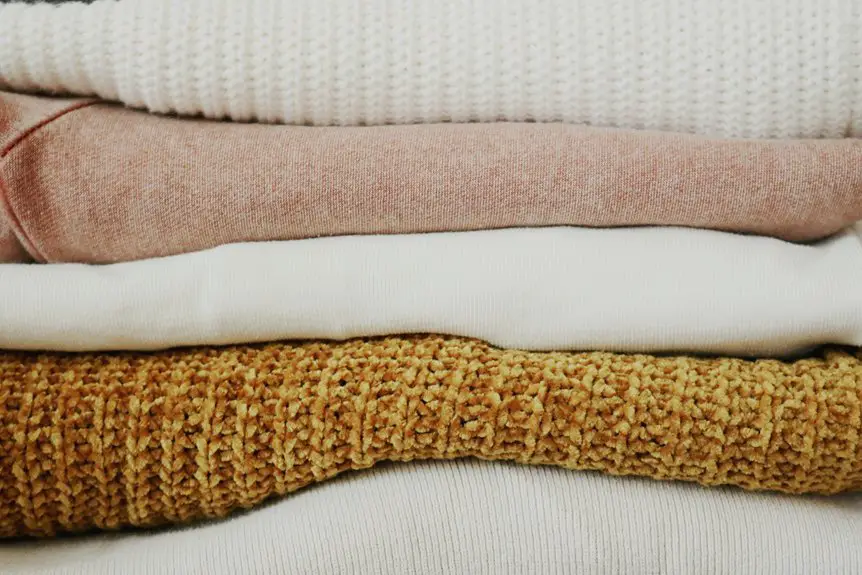To wash towels and keep them soft while preventing shrinkage, use warm water and the normal cycle for everyday towels. Choose liquid detergent to effectively remove stains, and consider adding a cup of white vinegar during the rinse cycle for extra softness. Tumble dry on low heat and remove them promptly to avoid over-drying. For more tips on maintaining your towels’ quality, check out some best practices to guarantee your towels last longer.
Table of Contents
Key Takeaways
- Wash towels in warm water to effectively remove dirt while minimizing shrinkage and enhancing softness.
- Use liquid detergent to prevent stiffness and ensure thorough cleaning without excess buildup.
- Incorporate a cup of white vinegar during the rinse cycle for added softness and freshness.
- Tumble dry on low heat or air dry to preserve fibers and prevent shrinkage.
- Store towels in a cool, dry place, ensuring they are completely dry before folding to avoid mildew.
Understanding Towel Fabrics and Their Care Requirements
When you choose towels, it’s important to understand the different fabrics and their specific care requirements.
Cotton towels are popular for their absorbency and softness but can shrink if washed in hot water.
Microfiber towels, on the other hand, dry quickly and resist mildew but require gentle washing to maintain their effectiveness.
Linen towels are lightweight and highly absorbent, yet they can be prone to wrinkles, so you’ll want to wash them with care.
Bamboo towels are eco-friendly and soft but need special attention to avoid damage.
Always check the care labels, as they provide vital information for maintaining the quality and longevity of your towels.
Check care labels for essential guidance on preserving the quality and extending the lifespan of your towels.
Choosing the right fabric for your needs guarantees you enjoy your towels for years to come.
Ideal Water Temperature for Different Types of Towels
When washing towels, the water temperature can make a big difference in cleanliness and fabric care.
Using warm water is ideal for most towels, as it helps remove dirt and bacteria effectively.
However, for delicate towels, you’ll want to stick to cooler temperatures to avoid damaging the fibers.
Warm Water Benefits
Although you might think all towels can be washed in the same way, the ideal water temperature can vary considerably based on the type of fabric.
Warm water is often the best choice for most towel types, offering numerous benefits that help maintain their quality. Here’s why you should consider using warm water:
- Effective Cleaning: Warm water penetrates fibers better, removing dirt and bacteria.
- Enhanced Softness: It helps to keep your towels fluffy and soft, making them a joy to use.
- Color Retention: Washing in warm water prevents fading, keeping vibrant colors intact.
- Reduced Odors: Warm water effectively eliminates musty smells, ensuring your towels smell fresh.
Delicate Towel Care
Not all towels are created equal, and different types require specific care to keep them in top condition.
For cotton towels, warm water is ideal, as it helps remove dirt while keeping them soft. If you’re washing microfiber towels, stick to cold water to avoid damaging the fibers.
For delicate fabrics like bamboo or linen, opt for a gentle cycle with cool water, as high temperatures can lead to shrinkage. Always check the care label for specific instructions, as some towels might have unique requirements.
By using the right water temperature, you’ll preserve your towels’ integrity and softness, ensuring they last longer and feel great against your skin.
Taking these steps can make all the difference!
Selecting the Right Washing Cycle for Optimal Cleaning
Choosing the right washing cycle is essential for ensuring your towels come out fresh and clean.
The cycle you select can make a big difference in maintaining their softness and longevity. Here’s what to take into account:
- Normal Cycle: Ideal for everyday towels, providing a thorough clean without excessive agitation.
- Gentle Cycle: A perfect choice for delicate or thinner towels, reducing wear and tear.
- Heavy Duty Cycle: Use this for heavily soiled towels, but be cautious as it may cause more shrinkage.
- Cold Water Setting: Helps to prevent color fading and shrinkage, while still effectively cleaning.
Choosing the Best Detergent and Additives
When washing your towels, selecting the right detergent and additives can make a big difference.
Liquid detergent works wonders for getting out stubborn stains, while fabric softeners can enhance softness.
Just remember, using too much detergent can lead to buildup, so stick to the recommended amounts.
Liquid Detergent Benefits
Liquid detergents offer several advantages that can enhance your towel-washing routine. They not only guarantee a thorough clean but also protect your towels from damage. Here are some benefits you won’t want to overlook:
- Better Dissolution: Liquid detergent mixes easily with water, penetrating fabric fibers for effective stain removal.
- Less Residue: Unlike powders, liquid detergents dissolve completely, leaving no gritty residue on your towels.
- Cold Water Efficiency: They work well in cold water, helping you save energy while still getting fresh, clean towels.
- Convenient Use: Measuring and pouring liquid detergent is often easier, allowing you to focus more on enjoying your soft towels.
Switching to liquid detergent can truly transform your laundry experience!
Fabric Softener Usage
Using the right fabric softener can elevate your towel-washing routine even further.
Look for a softener specifically formulated for towels, as it helps maintain their absorbency and softness. Avoid those with heavy fragrances or additives that can leave a residue.
When you add fabric softener, use it sparingly—just a capful is often enough. Pour it into the designated compartment of your washing machine, ensuring it distributes evenly throughout the load.
If you prefer a more natural alternative, consider white vinegar, which can soften towels without affecting their absorbency. Just add half a cup during the rinse cycle.
Avoiding Excess Detergent
How can you guarantee your towels stay fresh without overloading them with detergent? It’s simple—choose wisely and measure carefully. Using too much detergent can create a stiff, unpleasant texture, leaving you frustrated instead of relaxed.
Here’s how to avoid excess:
- Read Labels: Follow the manufacturer’s instructions on detergent usage.
- Use a Measuring Cup: Always measure your detergent to avoid guesswork.
- Choose Quality Detergent: Opt for a high-efficiency detergent that’s designed for your washing machine.
- Skip Additives: Avoid additional boosters unless absolutely necessary; they can build up and cause residue.
Effective Drying Methods to Preserve Softness
While drying towels might seem straightforward, choosing the right method can greatly impact their softness and absorbency.
To keep your towels fluffy, consider air-drying them instead of using a dryer. Hang them outside on a sunny day or inside on a drying rack, allowing fresh air to circulate.
If you prefer the dryer, toss in a couple of clean tennis balls or dryer balls; they’ll help fluff the fibers and reduce clumping. Set your dryer to a low heat setting to prevent damage.
Avoid over-drying, as this can lead to stiffness. Finally, remove your towels promptly once they’re dry to maintain their softness.
Following these drying methods will keep your towels feeling cozy and luxurious for each use.
Tips for Preventing Towel Shrinkage
After ensuring your towels are dried properly, it’s important to focus on preventing shrinkage to maintain their size and usability.
Here are some tips to keep your towels in great shape:
- Wash in cold water: Hot water can cause fibers to contract, leading to shrinkage.
- Avoid high heat when drying: Opt for low heat settings or air dry to preserve towel integrity.
- Choose the right detergent: Use a gentle detergent that won’t break down fibers quickly.
- Don’t overload the washer: This allows enough space for towels to move freely, reducing friction and wear.
Maintaining Towel Softness During Washes
To keep your towels soft and fluffy after each wash, it’s essential to follow a few simple guidelines.
First, use a gentle detergent that’s designed for delicate fabrics. This helps preserve the fibers without stripping away softness.
Wash your towels in warm water, but avoid hot water, as it can damage the fibers.
Make sure not to overload the washing machine; allowing enough space lets towels move freely and rinse thoroughly.
Additionally, consider adding a cup of white vinegar during the rinse cycle—it naturally softens fabric and removes detergent residue.
Finally, skip fabric softeners; they can create buildup that makes towels feel rough.
Common Mistakes to Avoid When Washing Towels
Even with the right techniques to keep your towels soft, it’s easy to make mistakes that can lead to less-than-ideal results.
Avoiding these common pitfalls can save you from frustration and keep your towels feeling luxurious:
- Overloading the Washer: Stuffing too many towels in can prevent proper cleaning and rinsing, leaving them stiff and musty.
- Using Too Much Detergent: Excess detergent can build up, making towels feel rough and less absorbent.
- Skipping Fabric Softener: While it seems harmless, skipping softener can lead to a coarse texture over time.
- Washing in Hot Water: Using hot water can cause towels to shrink and lose their fluffiness.
Best Practices for Long-Lasting Towels
When you want your towels to last, following a few best practices can make all the difference. First, wash them in warm water with a gentle detergent. Avoid fabric softeners, as they can build up and reduce absorbency. Instead, add white vinegar during the rinse cycle to maintain softness.
Don’t overload your washing machine; give your towels space to move freely.
After washing, tumble dry on low heat to prevent shrinkage. If you can, hang them outside to dry, as sunlight helps eliminate bacteria and freshens them up.
Ultimately, store your towels in a cool, dry place, ensuring they’re completely dry before folding. These simple steps will keep your towels looking and feeling great for years to come.
Frequently Asked Questions
How Often Should I Wash My Towels?
You should wash your towels every three to four uses. If they smell or feel damp, wash them sooner. Regular cleaning helps keep them fresh, soft, and hygienic for your next use.
Can I Mix Different Towel Colors in One Wash?
Mixing different towel colors in one wash can lead to dye transfer, especially with new towels. To be safe, wash similar colors together; it’ll keep your towels looking vibrant and prevent unwanted color mishaps.
Is It Okay to Use Bleach on Towels?
Using bleach on towels can be tricky. While it helps with stains, it can weaken the fabric over time. If you choose to use it, dilute it properly and avoid frequent use to maintain towel longevity.
Should I Wash New Towels Before First Use?
Think of new towels as unpolished gems; washing them first reveals their true softness. You should definitely wash new towels before use to remove excess dye, chemicals, and guarantee they’re fresh and ready for your skin.
What Should I Do if Towels Smell After Washing?
If your towels smell after washing, try re-washing them with vinegar or baking soda. Make certain they’re completely dry before storing them. Regularly clean your washing machine to eliminate any lingering odors and maintain freshness.
- Creating Stunning Paper Casts With Abaca Fiber Pulp - June 25, 2025
- Crafting With Abaca: 5 Easy Projects to Get You Started - June 25, 2025
- How to Make a Beautiful Bag Using Abaca Fiber: A DIY Tutorial - June 25, 2025







